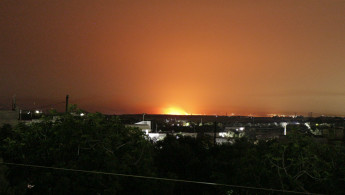It was not immediately clear who carried out the strikes in the desert near the town of Mayadin, which came minutes after Syrian air defences intercepted Israeli strikes over the north of the country, the Britain-based Syrian Observatory for Human Rights said.
A spokesman for the US-led coalition battling the Islamic State group said it was not responsible for the strikes.
Observatory head Rami Abdul Rahman said it was "likely" that Israel mounted the operation, which killed several Iraqi as well as Iranian fighters.
State media did not report the strikes.
Iranian-backed militias and their allies command a significant presence in eastern Syria south of the Euphrates Valley. The region lies close to the Iraqi border.
Israel has launched hundreds of strikes in Syria since the start of the civil war in 2011, targeting government troops, allied Iranian forces and Hezbollah fighters.
It rarely confirms details of its operations in Syria but says Iran's presence in support of President Bashar al-Assad is a threat and that it will continue its strikes.
Read also: Israeli officials claim Iran pulling out of Syria amid intensified airstrikes
An Israeli diplomatic official, who asked that their name be withheld, did not comment on the strikes but said "Iran was only country still shipping missiles and missiles technologies to their proxies in the region" amid the global health crisis.
Just before midnight on Monday, Syrian air defences intercepted Israeli missiles targeting a research facility in Aleppo province, state media said.
State news agency SANA said the intercepted missiles targeted several "military depots" in the Al-Safira area southeast of Aleppo, Syria's government-held second city.
On Friday, Israeli forces hit a missile depot in central Syria used by Lebanese Shia militant group Hezbollah, another Iran ally, hours after Israeli helicopters fired missiles at other targets in southern Syria.
Read also: Syria Weekly: Rami Makhlouf's fall from grace confirmed following video plea to Assad
Commenting on the apparent intensification of Israeli raids, Yoram Schweitzer of Israel's Institute for National Security Studies told AFP the Jewish state might be reacting to increased hostile action from Iran and Hezbollah.
It is also possible that Israel is trying to apply added pressure as its rivals endure the fallout of the coronavirus crisis, he said.
"I don't know which one of the two it is, but might be a combination of the two," Schweitzer said.
Follow us on Facebook, Twitter and Instagram to stay connected






 Follow the Middle East's top stories in English at The New Arab on Google News
Follow the Middle East's top stories in English at The New Arab on Google News

![MP Essam Diab's pursuit to block TikTok in Egypt has revived an already ongoing debate in the country. [Getty]](/sites/default/files/styles/image_330x185/public/1230748046.jpeg?h=a5f2f23a&itok=-8MqBLLC)
